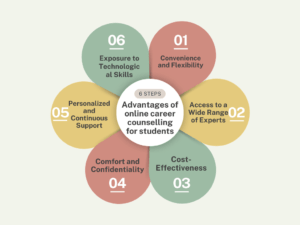Career counselling is an essential service for students, providing them with the guidance and support they need to navigate the often complex and confusing process of career planning and decision-making. In today’s rapidly changing job market, students face a number of choices and challenges as they consider their future careers.
Through personalized outreach, one-on-one sessions, and important resources, career counselling helps students explore various careers, decide on achievable goals, and articulate a case for their success in the preferred areas.
Career guidance makes students feel more comfortable with their abilities, interests as well as values enabling them to decide well about their studies as well as their work life journey. We will learn all the benefits of career counselling through this article.
Significance of Career Counseling Programs in Influencing the Development of Students
6 Advantages of online career counselling for students
Online career counselling offers numerous advantages for students. Here are some key benefits:
Convenience and Flexibility:
Students can plan their sessions at any convenient time to avoid conflicts with their classes or other school activities because students are busy too. They can conduct sessions from anywhere so long as it suits them. It also makes home-based access possible, seeing that there is no need for traveling during these times hence choosing places like the living room or study room becomes better.
Access to a Wide Range of Experts:
Many platforms are available on the internet through which students from different geographical points can connect with career advisors thereby giving them a chance to gain a lot from a broad range of job information and guidance as well. It is only a counselor focusing on the area of interest for the student who can provide specific directions.
Cost-Effectiveness:
Online counselling can help students save money as they do not have to spend on transportation or other costs as it is often the case with visiting the counselor in person. There are many online platforms that provide a diverse payment plan or pricing scheme readily accessible to everyone.
Comfort and Confidentiality:
It is common for students to feel most at ease talking about their concerns in the environments they prefer thereby creating a situation where communication is equally candid and open. Anonymous posting encouraged on varied online platforms has inspired those students who may be unable to express their problems or victims of introvertness to speak freely to someone else without fear of discrimination.
Personalized and Continuous Support:
Students have the opportunity to remain in touch via emails, chat, and video calls, which leads to continuous support along their career planning journey. Online management is possible for the follow up sessions and tracking of progress.
Exposure to Technological Skills:
When students take part in online counselling, they are able to feel more comfortable regarding gadgets which are necessary in the modern-day world. For their future career prospects, students acquire knowledge on diverse online platforms among other matters.

What topics are covered in a comprehensive career counselling course?
A comprehensive career counselling course covers a broad range of topics designed to equip counselors with the knowledge and skills needed to effectively guide individuals in their career paths. Here are some key topics typically included:
Introduction to Career counselling
- History and evolution of career counselling
- Roles and responsibilities of a career counselor
- Ethical and legal considerations in career counselling
Theories of Career Development
- Overview of major career development theories
- Application of these theories in counselling practice
Career Assessment and Evaluation
- Types of career assessments (aptitude tests, personality assessments)
- Administering and interpreting assessment results
- Using assessments to guide career planning
Career Exploration and Planning
- Techniques for helping clients explore career options
- Identifying skills, interests, values, and personality traits
- Developing short-term and long-term career plans
Job Search Strategies
- Resume and cover letter writing
- Job search techniques (networking, online job boards, career fairs)
- Interview preparation and practice
Developing Soft Skills
- Importance of soft skills in career success
- Communication, teamwork, problem-solving, and leadership skills
- Techniques for enhancing these skills in clients
Internship and Practicals
- Gaining hands-on experience through supervised internships or practicals
- Applying theoretical knowledge in real-world settings
- Reflective learning and feedback from experienced professionals
Key benefits of career counselling for students
Career counselling is beneficial to students in so many ways by helping them know what they want for themselves in the future and how their personal traits and interests align with these career aspirations. Some reasons include:
Self-Discovery and Awareness
Identifying Strengths and Weaknesses: Advising young individuals about what it is that they are most passionate about career-wise can be instrumental in their path towards self-discovery, as they come into contact with their own talents, interests or personalities that can guide them in making better vocational choices.
Clarifying Interests: Through a number of assessments and discussions students are able to discover what they are genuinely interested in and passionate about.
Informed Decision Making
Exploring Career Options: It’s exposure to a wide variety of career options for students where they can gather all possible information about numerous fields and professions as well as educational levels necessary.
Educational Pathways: Counselors provide guidance on the best educational paths, including courses, degrees, and certifications needed for specific careers.
Goal Setting and Planning
Short-term and Long-term Goals: Career advisors help students develop practical career aims that can be accomplished by breaking them down into smaller achievable objectives.
Action Plans: Students receive assistance in creating detailed action plans to reach their career objectives.
Improved Academic Performance
Motivation and Focus: Understanding the connection between academic performance and career success can motivate students to work harder and stay focused on their studies.
Relevant Coursework: Learners have the option to choose the papers that are in line with their career objectives hence making their study duration more engaging and valuable.
Enhanced Employability
Skill Development: Career counselling emphasizes the importance of developing both hard and soft skills needed in the job market.
Resume Building: Students learn how to create effective resumes and cover letters tailored to their desired career paths.
Job Search and Application Strategies
Interview Preparation: Counselors dole out advice as well as hands-on training on job interviews so that students become self-assured and successful professionals.
Job Search Techniques: Students learn effective job search strategies, including networking, using job boards, and leveraging social media.
Access to Resources and Opportunities
Scholarships and Financial Aid: Guidance counsellors can supply data on scholarships, grants and other financial aids available for students pursuing education.
Internships and Work Experience: Students can receive guidance on finding internships and part-time jobs that provide valuable experience and enhance their resumes.
Networking Opportunities
Professional Connections: The area of career counselling presents many chances for engaging with industry experts, graduates or those who may offer jobs.
Building a Network: Students learn the importance of networking and how to effectively build and maintain professional relationships.
What should students expect to learn in a career guidance class?
In a career guidance class, students can expect to learn the following key areas to help them make informed decisions about their future careers:
Self-Assessment and Awareness
Understanding Strengths and Interests: Use different types of assessments to recognize one’s strengths and standards of conduct which are deemed important.
Personality Traits: Ascertain what kind they are and then link all of the kinds with relevant professions.
Career Exploration
Industry Knowledge: Navigate a variety of sectors and know what kind of opportunities and problems are encountered there.
Job Roles and Responsibilities: Get information on particular corporate positions, their duties as well as what a normal working day is usually like in different fields.
Career Options: Get to know a lot of profession variants and options.
Educational and Training Requirements
Academic Pathways: Understand the educational requirements for different careers, including necessary degrees, certifications, and vocational training.
Course Selection: Learn how to choose courses and extracurricular activities that align with career goals.
Career Planning
Setting Goals: Create short-term as well as long-term career goals and ensure that you come up with step by step plans that can enable you to attain them.
Action Plans: Formulate specific ways that can help you in your educational path and how you decide in your career journey.
Job Search Skills
Resume and Cover Letter Writing: Learn how to create effective resumes and cover letters tailored to specific job applications.
Interview Techniques: Acquire expertise and belief in getting ready for job interviews and have good results in them
Networking: Know significance of networking as well as creating and using professional connections
Soft Skills Development
Communication Skills: Improving the verbal and writing competency is so vital to professional career growth.
Teamwork and Collaboration: One of the major aspects of teamwork is its importance followed by the significance that lies in promotion strategies among workers.
Problem-Solving and Critical Thinking: Enhancement in identification of problems and thinking capacity are fundamental requirements.
What are the requirements of obtaining a career counselling certification?
Obtaining a career counselling certification typically involves meeting several educational, experiential, and professional requirements. Here are the common steps and requirements:
Educational Requirements
Bachelor’s Degree: It is usual for there to be a need for at least a bachelor of psychology, educational science, counselling or relevant fields’ degree.
Master’s Degree: counselling experts or instructors from different angles can desire or demand for admission to programs without necessarily having any undergraduate certificates, although they have specialized knowledge.
Relevant Coursework
counselling Courses: Courses in counselling theories, techniques, and ethics.
Career Development: Specific courses focusing on career development theories, career counselling techniques, and vocational psychology.
Assessment and Evaluation: Training in the use of various career assessment tools and techniques.
Practical Experience
Internship/Practical: Supervised practical experience completion, usually done during a master’s program, allows candidates to apply counselling techniques in real-world settings
Work Experience: Some certifications require a certain number of hours of professional experience in career counselling or a related field.
Certification Programs
Accredited Certification Programs: Enrollment in a recognized certification program such as those offered by professional organizations (ex. National Career Development Association – NCDA, International Association of Career Advisors – IACA).
Training Workshops: Engagement in workshops, seminars and further education programs which are relevant to academic and vocational advice.
Examinations
Certification Exam: Passing a certification exam that tests knowledge and skills in career counselling.
Examples include the NCDA’s Career Development Facilitator (CDF) exam.
Application Process
Application Submission: Fulfilling an application for certification, including proof of education, job experience, and other related documentation.
Application Fees: Paying any application or certification fees.
Conclusion
In an ordered sequence that ensures that practitioners have what is needed to dispense competent advice to anyone who requires it, anyone can acquire a career counselling certificate. Professional coaching certification is obtained through meeting educational qualifications, receiving clinical instruction, passing all relevant exams, and maintaining contemporary standards in the profession.
This certificate does not just improve the trustworthiness of the counselor and his or her knowledge but also confirms that they follow the strictest ethical rules while implementing advice. After all, career counselling certification is very important for anyone who wants to be professionally significant in career growth and counselling, which are becoming new industries in our times.
FAQs
1.Who can benefit from career counselling?
counselling to help a person decide what job they will do can assist a lot of people such as those who are still learning in high schools as well as colleges , people who have just attained their degree, those seeking for new job opportunities and professionals who are looking forward to being promoted or want to move from one job to another.
2. What does a career counselor do?
A career counselor gives bespoke recommendations and encouragement to assist people figure out their professional ambitions, set some occupational objectives, acquire skills to look for a job, and surmount career matters. The usage can entail evaluations, one on one talks, group discussions or other sources.
3. Can career counselling help with job search strategies?
Yes, finding a job can be supported by career counselling including preparing for a resume, writing cover letters and training for interviews.










